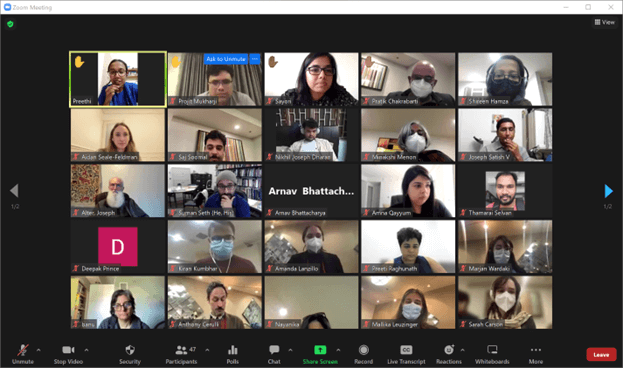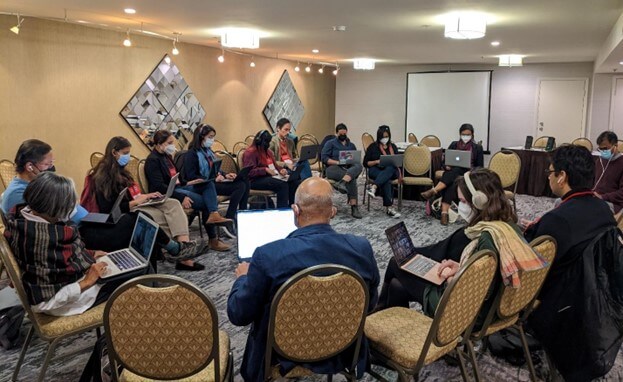Is Decolonization a Useful Term for Science Studies in South Asia? A Report on the 2022 STM Symposium
Sayori Ghoshal, Shireen Hamza and Kiran KumbharNovember 28, 2022 | Report-Backs
For nearly a decade, science studies scholars have organized the Science, Technology & Medicine (STM) symposium at the Annual Conference on South Asia at Madison, Wisconsin. This event has been a forum for historians, anthropologists, and other scholars to share their work in progress. Until this year, it has largely been attended by scholars at institutions in North America because of the challenge of finding resources to support travel and attendance by scholars based in South Asia. Increased facility with Zoom among scholars internationally made it possible for us to imagine something different this year. In this report, the three organizers and authors of this post summarize the major themes discussed during the symposium, and reflect on the experience of joining an amazing cohort of nearly fifty discussants, half based in North America and half in South Asia.

A screenshot of the Zoom session during the hybrid session of the symposium. The image shows twenty-five scholars, half of the participants of that session. [Photo by Shireen Hamza]
In the hours leading up to the in-person symposium, Sayori facilitated a virtual meeting attended by over twenty participants. These scholars included graduate students, early career researchers and permanent faculty working on STM topics at a variety of public and private institutions in India and Pakistan. After the first session, they were then joined on Zoom by the in-person participants of the STM symposium, who were tuning in from our conference room at Madison on their individual devices. In this hybrid session, there was no visual asymmetry between those who had joined online and those who had joined in-person – each participant was a small box on the screen. This virtual flattening of our different circumstances later became a topic of conversation.

Fourteen in-person participants sitting in chairs in an oval shape, at a conference room in Madison, Wisconsin. Each person had joined the hybrid session over Zoom. [Photo by Shireen Hamza]
Bringing together scholars who are all working on STM in South Asia but based in different geopolitical and academic contexts enriched the overall discussion immensely. It also made it possible for scholars to share their first-hand experiences of Global North-South hierarchies, unequal access, and academic hegemonies. Several scholars in South Asia questioned the need to constantly address – even if to critique – decolonization in the history of science, a term which seemed better suited to settler colonial contexts in the Global North. Are decolonial endeavors also running the risk of becoming Eurocentric, if these overlook regional inequalities and hierarchies? If we foregrounded the casteist and sexist structures implicated in biomedicine, Ayurveda, Unani, and Siddha medicines, for instance, what would it look like to decolonize the history of medicine in South Asia?
Finally, the conversation turned towards suggestions for next steps. Many participants from all locations shared their difficulties around accessing archival research, ranging from a desire for digitized documents to the need to have a listserv we can turn to with questions emerging when planning and undertaking research. As organizers, we view this brief and engaging symposium as part of an ongoing effort to bolster the field of STM in South Asia, and hope that others will use the database of participants we compiled to organize future initiatives. We are happy to share that list upon request, and we have also made available this list of resources for anyone interested in this topic.
The hybrid session was followed by a much-needed coffee break, after which the in-person participants at Madison returned to the room for small-group discussions, to digest and extend the conversation. Some participants mentioned feeling the absence of the many colleagues we had just met in the subcontinent, and others expressed a desire to be able to re-convene there, in the future. The symposium officially ended around noon, but the reflections and conversations carried over to lunch – and we hope will continue into next October.
Sayori Ghoshal (@corridor_person) is a postdoctoral fellow at Krea University and University of Toronto. Her research on 19th-20th century India is at the intersection of the history of science, the interrelations between race, religion and caste, and the history of modern governance.
Shireen Hamza (@ibn_shireen) is interested in the history of science and medicine in the medieval Islamic world, and more broadly, in the non-modern non-West. Her dissertation project is a study of how groups of male Muslim scholars made a transregional tradition of medicine local, in three sites across the medieval Indian Ocean world. She has also published on the history of gender and sexuality. She is a doctoral candidate in the History of Science at Harvard University with a secondary field in Critical Media Practice, which has enabled her to use audio, moving image, and movement research to explore themes from her historical research.
Kiran Kumbhar (@kikumbhar) is the Dr Malathy Singh Postdoctoral Associate and Lecturer at Yale University’s South Asian Studies Council. He primarily works on modern South Asian history and on the history of healthcare and the biomedical profession in post-independence India. His teaching and public scholarship work broadly focus on the history and anthropology of science and healthcare in the Global South.
Published: 11/28/2022
